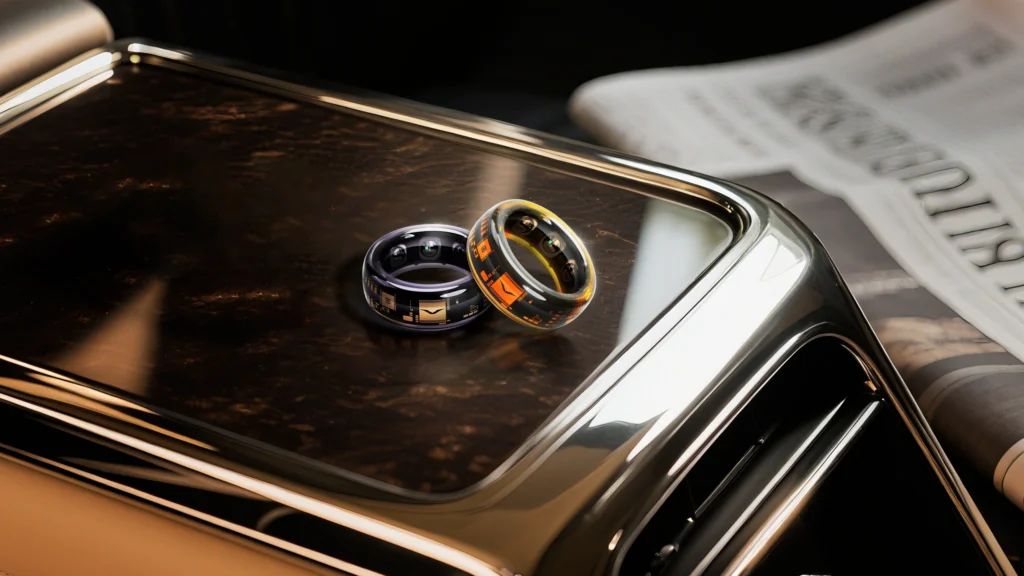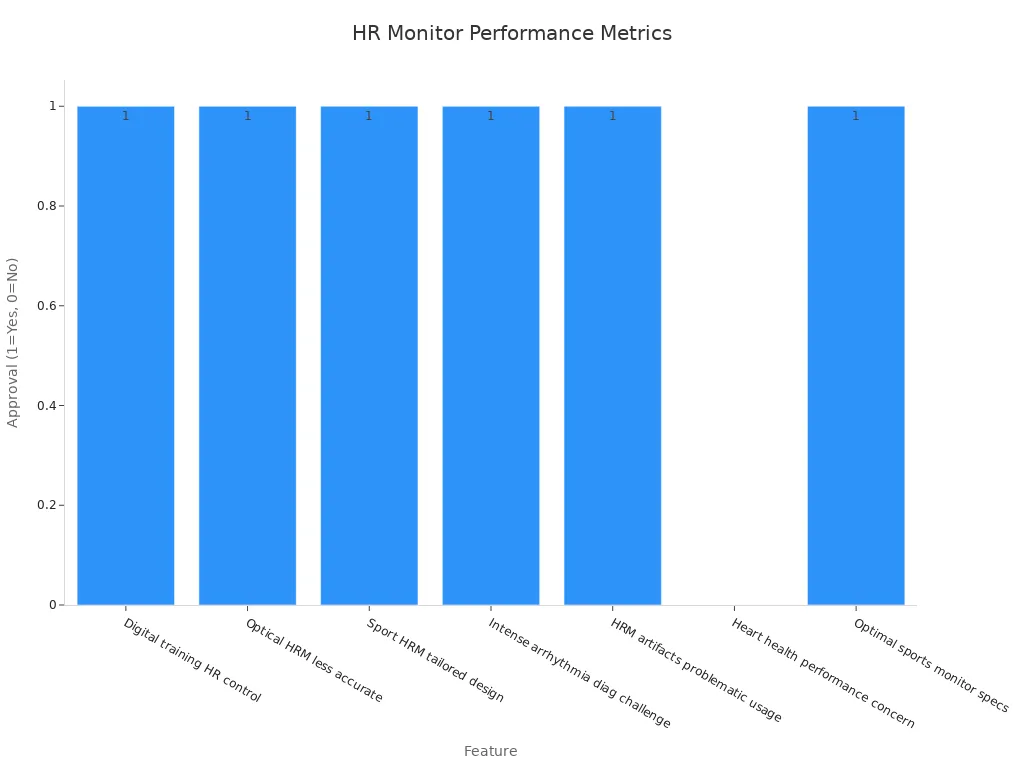
If you care about fitness or want to learn how to check heart rate effectively, finding a reliable Heart Rate Monitor is essential. These devices are no longer just for athletes—they're for anyone aiming to maintain a healthy lifestyle. By 2025, 562.86 million people are expected to use smartwatches, highlighting the growing trend of using technology to stay active and informed. Whether you're counting calories, improving stamina, or staying within your optimal heart rate zone, the right monitor can make a significant difference. Choosing one that aligns with your needs ensures every workout is more efficient and rewarding.
Key Takeaways
-
Heart rate monitors help people get fit and stay healthy.
-
The Polar H10 is the top choice. It is accurate, comfy, and has a long battery life. It works well for many activities.
-
Runners will like the Garmin Forerunner 265. It tracks VO2 Max and hill climbing to improve training.
-
Cyclists should try the Wahoo TICKR. It is precise and strong, great for long rides.
-
If you want to save money, choose the Basic Monitor. It has key features and good accuracy for a low price.
Best Overall Heart Rate Monitor
Product Highlights
The Polar H10 is one of the best heart rate monitors. It is a chest strap monitor made for athletes and fitness lovers. It gives very accurate heart rate readings during tough workouts. The strap is soft and fits well, so it stays in place even during hard exercises.
The Polar H10 connects easily with Bluetooth and ANT+. You can pair it with fitness apps or devices you like. It is waterproof up to 30 meters, so you can use it while swimming. Its battery lasts 400 hours, so you won’t need to charge it often.
Here’s how the Polar H10 compares to similar products:
|
Feature |
Polar H10 |
Similar Products |
|---|---|---|
|
Accuracy |
Very accurate readings |
Varies |
|
Comfort |
Soft and secure fit |
May vary |
|
Battery Life |
400 hours |
Usually less |
|
Connectivity |
Bluetooth, ANT+ |
Fewer options |
|
Waterproof Rating |
Up to 30 meters |
Varies |
|
Overall Rating |
5/5 |
Varies |
Pros and Cons
Pros:
-
Very accurate heart rate tracking.
-
Comfortable strap that stays in place.
-
Long battery life for long-term use.
-
Connects easily to fitness apps and devices.
-
Waterproof, great for swimming.
Cons:
-
Some people may prefer wrist monitors over chest straps.
Bottom Line
The Polar H10 is a great choice for improving your fitness. It is accurate, strong, and full of useful features. Whether you are running, swimming, or working out, this monitor gives you the data you need to get better results.

Best Heart Rate Monitor for Running
Product Highlights
Runners need a monitor that works well and gives correct data. The Garmin Forerunner 265 is a great pick for running. It’s worn on the wrist and uses smart sensors to track heart rate accurately, even during tough runs. Its light design makes it comfy, so you can focus on running without distractions.
The Forerunner 265 is special because it tracks running stats. It measures VO2 Max, showing how fit your heart and lungs are. It also checks your Training Status to see if you're improving or overdoing it. For trail runners, the Velocità Ascensionale Media (VAM) feature tracks how fast you climb hills, helping you on steep paths.
Here’s a quick look at its key features:
|
Metric |
What It Does |
|---|---|
|
Aerobic Decoupling (Pa:Hr) |
Watches heart rate changes during steady runs to check endurance. |
|
Efficiency Factor (EF) |
Compares your speed to heart rate to improve running skills. |
|
Velocità Ascensionale Media |
Tracks hill climbing speed, great for trail runners. |
|
Base Fitness |
Measures long-term strength and stamina growth. |
|
Training Status |
Shows if you're improving, staying the same, or overdoing it. |
|
Running Fitness |
Checks your running ability at different effort levels. |
|
VO2 Max |
Measures how much oxygen your body uses during hard exercise. |
|
Resting Heart Rate |
Shows recovery and fitness level; lower rates mean better fitness. |
Pros and Cons
Pros:
-
Tracks running stats like VO2 Max and VAM.
-
Light and comfy for long runs.
-
Gives accurate heart rate data with small errors (about 3 beats).
-
Helps you see training progress and recovery.
Cons:
-
Wrist monitors might miss heart rate spikes during intense runs.
Bottom Line
The Garmin Forerunner 265 is an excellent heart rate monitor for runners. It has advanced features and is very accurate, making it perfect for improving your running. Whether you're training for a race or jogging for fun, this monitor gives you the info you need to reach your goals.
Best Heart Rate Monitor for Cycling
Product Highlights
Cyclists need a monitor that is accurate and strong for long rides. The Wahoo TICKR is the best heart rate monitor for cycling. It is a chest strap monitor that gives very accurate readings. This helps you track your workouts better. Its light design and adjustable strap make it comfy for long rides, even when cycling hard.
The Wahoo TICKR connects easily with Bluetooth and ANT+. You can pair it with fitness apps or cycling devices you use. Its battery lasts 500 hours, so you won’t need to charge it often. It has an IPX7 waterproof rating, so it works well in sweat, rain, or bad weather.
Here’s how the Wahoo TICKR compares to other cycling monitors:
|
Monitor Name |
Price |
Battery Life |
Connectivity |
Waterproof Rating |
|---|---|---|---|---|
|
Wahoo TICKR |
$50 |
500 Hours |
Bluetooth, ANT+ |
IPX7 |
|
Moofit HR8 |
$25 |
300 Hours |
Bluetooth, ANT+ |
IP67 |
|
COOSPO HW807 |
$50 |
20 Hours |
Bluetooth, ANT+ |
IP67 |
|
Powr Labs |
$32 |
8760 Hours |
Bluetooth, ANT+ |
IP67 |
Pros and Cons
Pros:
-
Very accurate chest strap for tracking heart rate.
-
Long battery life for long cycling trips.
-
Connects easily with Bluetooth and ANT+.
-
Waterproof for use in all weather.
Cons:
-
Costs more than some cheaper options.
Bottom Line
The Wahoo TICKR is great for cyclists who want accuracy and dependability. Its chest strap design tracks heart rate precisely. The long battery life and strong connectivity make it reliable for any ride. Whether you're racing or riding for fun, this monitor helps you reach your fitness goals.
Best Budget Heart Rate Monitor
Product Highlights
If you want a good heart rate monitor for less money, the Basic Monitor is a great option. It costs only $30 and has useful features like Bluetooth and ANT+ connections. This makes it work well with most fitness apps and devices. You can use it to track your heart rate while running, biking, or working out at the gym.
It may not have fancy features like expensive models, but the Basic Monitor works well. Research shows budget monitors are fairly accurate, with errors usually within ±10%. This means you can trust its data to help improve your workouts.
Here’s how the Basic Monitor stacks up against others:
|
Heart Rate Monitor |
Price |
Key Features |
|---|---|---|
|
Polar H10 |
$90 |
Accurate ECG readings, 400 hours battery life, multi-device compatibility |
|
Basic Monitor |
$30 |
Bluetooth and ANT+ connectivity |
|
Suunto Race |
$450 |
Advanced features beyond heart rate monitoring |
Pros and Cons
Pros:
-
Low price, so it’s affordable for everyone.
-
Connects easily with Bluetooth and ANT+ for fitness apps.
-
Lightweight and comfortable for any workout.
Cons:
-
Doesn’t have advanced features like VO2 Max or ECG tracking.
Bottom Line
The Basic Monitor shows you don’t need to spend a lot for a dependable heart rate monitor. It has the basic features, good accuracy, and works with popular fitness apps—all for a low price. Whether you’re new to fitness or need a backup, this monitor is a smart and budget-friendly choice.
Best Heart Rate Monitor for Swimming
Product Highlights
Swimming makes tracking your heart rate harder. The Polar H10 solves this problem. It’s a chest strap monitor made for swimmers. Its silicone electrodes stay on your skin, giving accurate readings. Water doesn’t mess with its performance.
Wrist monitors often fail in water, but not the Polar H10. Tests show chest straps like this are more accurate for swimming. It’s waterproof up to 30 meters, so you can swim without worry.
The Polar H10 works well with fitness apps. You can check your swimming stats easily. Whether training for a race or building endurance, this monitor helps you reach your goals.
Pros and Cons
Pros:
-
Very accurate, even underwater.
-
Stays secure with silicone-framed electrodes.
-
Waterproof for swimming and water sports.
-
Works with many fitness apps.
Cons:
-
Some people may not like wearing a chest strap.
Bottom Line
The Polar H10 is perfect for swimmers who need accuracy. Its sensors track heart rate well, even in water. If you want to improve your swimming or track your health, this monitor is a great choice.
Best Smartwatch with Heart Rate Monitoring
Product Highlights
The Garmin Vivoactive 5 is a great smartwatch for tracking heart rate. It uses advanced PPG sensors to measure your heart rate accurately when resting. During hard workouts, its accuracy might drop a bit, but it still gives helpful health data. This makes it a favorite for fitness fans.
This smartwatch does more than just track heart rate. It also checks your breathing, VO2 max, and sleep quality. These features help you learn about your fitness and recovery. Runners and outdoor lovers will like its pace alerts and precise distance tracking.
Here’s a simple comparison of smartwatch accuracy:
|
Device Type |
Accuracy at Rest |
Accuracy During Activity |
|---|---|---|
|
Smartwatch |
High |
Moderate to Low |
Smartwatches like the Vivoactive 5 are more than fitness gadgets. They use AI to predict health issues, which could save lives.
Pros and Cons
Pros:
-
Tracks heart rate, VO2 max, and sleep patterns.
-
Lets you set pace alerts for custom workouts.
-
Tracks distance accurately for outdoor activities.
-
Stylish and easy to use.
Cons:
-
Some may find it too big to wear.
-
Not as accurate during intense exercise.
Bottom Line
The Garmin Vivoactive 5 is a top smartwatch for heart rate tracking. It combines smart features with reliable data, making it great for fitness lovers. Whether you're checking your heart rate or tracking workouts, this watch helps you stay healthy and active.
Best Wearable Heart Rate Monitor: Aura Ring by VERTU
Product Highlights
If you want a stylish heart rate monitor, the Aura Ring by VERTU is amazing. This ring combines advanced health tools with a sleek look. It feels light and fits like a second skin. It’s more than a ring—it’s like having a health coach on your finger.
The Aura Ring tracks heart rate, sleep, oxygen levels, blood pressure, and glucose. Its tiny sensors give very accurate readings, making it super reliable. With over 85% accuracy, you can trust its data to improve your health and workouts.
What makes this ring special is how it gives advice. It doesn’t just show numbers—it explains what they mean for you. Whether you’re exercising, resting, or just moving around, the Aura Ring helps you stay informed without being annoying.
Its comfy design lets you wear it all day, and its shiny material looks fancy. You’ll barely feel it on your finger, but you’ll love the helpful health info it provides.
Pros and Cons
Pros:
-
Tracks heart rate, sleep, and other health stats.
-
Gives advice based on your personal data.
-
Lightweight and easy to wear all day.
-
Stylish design that looks great and works well.
-
Very accurate for heart rate tracking.
Cons:
-
No major downsides.
Bottom Line
The Aura Ring by VERTU is great for anyone wanting a wearable heart rate monitor that’s both useful and stylish. It’s perfect for tracking health and fitness with high accuracy. Whether you’re working out or relaxing, this ring helps you stay on top of your health goals.
How Heart Rate Monitors Work
Optical Sensors vs. Chest Straps
Heart rate monitors use two main types of sensors: optical sensors and chest straps. Each type works differently and has its own benefits.
Chest straps use ECG technology to measure heart signals. They wrap around your chest and are very accurate, even during hard workouts. Studies show chest straps have errors as low as 0% to 0.83%. This makes them great for tracking exercise effort and energy use.
Optical sensors use PPG technology to check blood flow changes with light. These are usually found in wrist or arm monitors. They are easy to wear but less accurate during fast movements. Tests show mixed results, especially in busy environments.
|
Sensor Type |
Accuracy (%) |
Notes |
|---|---|---|
|
ECG |
98.1 |
Best for heart rate tracking |
|
PPG |
87 – 92.71 |
Can be affected by movement |
|
SCG |
99.9 (TPR) |
Very accurate for heart rhythm issues |
|
SV |
>99 |
Works well but sensitive to motion |
Key Metrics Monitored
Heart rate monitors track more than just your pulse. They give useful data about your health and fitness.
-
Heart Rate Zones: Show how hard you’re exercising to improve workouts.
-
Resting Heart Rate: Lower rates mean better heart health.
-
VO2 Max: Measures how well your body uses oxygen during exercise.
-
Training Load: Tracks how much strain your body feels during workouts.
-
Energy Expenditure: Estimates calories burned to show activity levels.
These metrics help you plan workouts to meet your fitness goals, like building stamina or recovering faster.
Integration with Fitness Apps
Modern heart rate monitors connect with apps to make your data useful. Apps let you see progress, set goals, and analyze your heart rate.
|
Feature |
Description |
|---|---|
|
Real-Time Heart Rate Tracking |
Shows your heart rate live and saves the data. |
|
Heart Rate Zones |
Lets you set zones for different exercises. |
|
Exercise Tracking |
Gives detailed workout stats. |
|
Resting Heart Rate Monitoring |
Tracks trends to check recovery and fitness. |
|
Historical Data Analysis |
Lets you review past heart rate patterns. |
|
Custom Alerts |
Sends warnings if your heart rate is too high or low. |
|
Data Sync and Backup |
Saves your data to the cloud and syncs across devices. |
|
Integration with Wearables |
Works with smartwatches and rings easily. |
|
HealthKit and Google Fit Integration |
Combines heart rate data with other health info for better insights. |
These features make heart rate monitors more helpful and fun, keeping you motivated on your fitness journey.
Benefits of Using a Heart Rate Monitor
Improved Workout Efficiency
Heart rate monitors make workouts more useful and focused. They help you stay in the right heart rate zone. This ensures you’re not working too hard or too little. Personalized zones match your fitness level, so every workout counts.
These devices also show how hard you’re exercising. If you’re overdoing it, you can slow down to avoid burnout. If you’re not trying enough, you’ll know to push harder. Studies say heart rate zones are about 67% accurate. This helps you plan workouts that give better results.
Here’s how heart rate monitors improve workouts:
|
Benefit |
Description |
|---|---|
|
Matches training to your fitness level for better results. |
|
|
Quantifying Workout Intensity |
Helps adjust effort to avoid wasting time or overdoing it. |
|
Improved Performance |
Builds endurance by keeping heart rate in the right range. |
Tracking your heart rate helps you make smarter choices and see progress.
Tracking Health Metrics
Heart rate monitors aren’t just for exercise—they track health too. They measure things like resting heart rate, oxygen levels, and sleep quality. Chest straps are best for tough workouts. Wrist monitors and rings work well for rest or light activity but may miss details during hard exercise.
These tools give you helpful data about your body. For example, a lower resting heart rate shows a stronger heart. Watching these numbers helps you spot changes and improve your habits. Whether you want to get fit or stay healthy, heart rate monitors give useful insights.
Preventing Overtraining
Overtraining can cause injuries, but heart rate monitors help stop this. They track heart rate variability (HRV), which shows how well you recover. A lower HRV means you’re pushing too hard. This lets you adjust before problems start.
Research shows HRV drops as workouts get harder. Fit people usually have higher HRV, meaning they recover faster. While more research is needed, HRV-based training could make workouts more personal and effective.
Heart rate monitors are simple to use and affordable. They’re a great tool for staying healthy and improving fitness without overdoing it.
Picking the best heart rate monitor depends on your needs. Here’s a simple summary of the top choices:
-
Best Overall: Polar H10, super accurate and very flexible.
-
Best for Running: Garmin Forerunner 265, tracks advanced running stats.
-
Best for Cycling: Wahoo TICKR, strong and highly precise.
-
Best Budget: Basic Monitor, works well without costing much.
-
Best for Swimming: Polar H10, great for underwater tracking.
-
Best Smartwatch: Garmin Vivoactive 5, stylish and packed with features.
-
Best Wearable: Aura Ring by VERTU, sleek and tracks health accurately.
🏋️♂️ Tip: Chest straps are best for athletes. Wrist monitors or rings are easier for everyday use.
Think about what you need and how you exercise. The right monitor will fit your life perfectly!
FAQ
What is the most accurate type of heart rate monitor?
Chest strap monitors are the most accurate. They use ECG technology to measure your heart's electrical signals. This makes them perfect for intense workouts or activities where precision matters. Wrist monitors and rings are convenient but may not match the accuracy of chest straps.
Can I use a heart rate monitor without a smartphone?
Yes, many heart rate monitors work independently. Devices like chest straps or smartwatches store data internally. Later, you can sync the data with apps. Some even display real-time stats on compatible fitness equipment, so you don’t need a phone during workouts.
How do I choose the right heart rate monitor?
Think about your activities and goals. For running, a wrist monitor might work best. Swimmers should pick waterproof chest straps. If you want style and health tracking, go for a wearable like the Aura Ring. Match the features to your needs.
Are heart rate monitors safe to wear all day?
Absolutely! Most monitors, especially wearables like rings or wristbands, are designed for all-day comfort. They track your heart rate, sleep, and other metrics without causing harm. Just ensure the device fits well and doesn’t irritate your skin.
Do heart rate monitors work for beginners?
Yes, they’re great for beginners! Heart rate monitors help you understand your fitness level and guide your workouts. They show if you’re exercising too hard or not enough. Even basic models provide valuable insights to improve your health and fitness journey.




